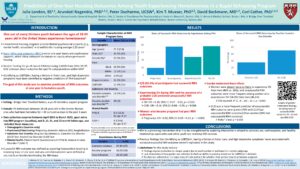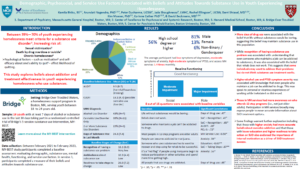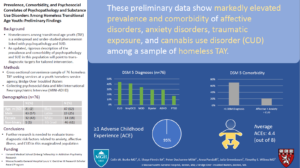Research
Bridge Center for Youth Research and Project Development
Research Collaboration
Building on a history of research participation, Bridge has partnered with MGH’s Psychiatry Department and their Center of Excellence to form a robust collaboration that unites researchers with the often-understudied demographic of homeless youth. This partnership allows Bridge to leverage the expertise and resources of a world-renowned research organization to assess the efficacy of our model and methods. In an increasingly data-driven world, providing proof of impact and testing our services through research solidifies our status as a leader in the field of youth homelessness, and provides us with concrete results we can share and disseminate.
Research Papers
In order to understand more about the factors that prevent suicidality in youth experiencing homelessness, data from comprehensive interviews with young adults at Bridge was analyzed. The main take-away from this analysis is that higher internal resilience (for example: agreeing with the statement “I am able to adapt when changes occur”) was related to lower rates of suicidal thoughts and self-injurious behaviors. In addition, this relationship was explained by the young adults’ feelings of social connectedness to others. This is the first known quantitative confirmation of past qualitative research findings in this area.
Young adults who experience homelessness are likely to have been exposed to a high level of Adverse Childhood Experiences (ACES), such as abuse, experiencing or witnessing violence, and/or a family member’s suicidality. A cluster analysis was conducted to create subgroups of participants, who completed structured assessments at Bridge, to understand more about the different levels of exposure to ACES in this population. The analysis describes three unique groupings. The characteristics of these subgroups and implications for trauma-informed care are discussed.
Building on previous work, the results of semi-structured diagnostic interviews were conducted and analyzed in order to uncover specific diagnostic subgroups to understand more about the typical mental health complexities of youth experiencing homelessness. Four diagnostic subgroups (or “clusters”) were identified and their associations with high-risk behaviors were examined.
Little is known about young people’s outcomes after Rapid Re-Housing programs, which provide case management and short-term rental assistance to young adults. In this study, substance use and psychiatric illness were compared to housing outcomes after Rapid Re-Housing. Results show that alcohol use disorder and cannabis use frequency predicted worse housing outcomes. Implications regarding treatment are discussed in the article.
This study, published in the Journal of the American Academy of Child and Adolescent Psychiatry (JAACAP), administered a semi-structured psychiatric diagnostic interview to determine rates of specific behavioral health disorders and comorbid (co-occurring) substance use diagnoses. To read the MGH article on the study, click here. This article was chosen as one of the JAACAP’s Editors’ Best of 2023.
Research Posters
Prediction of One-Year Housing Outcomes Among Youth Experiencing Homelessness in a Rapid Re-housing Program (2023) – presented at the Harvard Public & Community Psychiatry Symposium 2023
This research poster utilized a retrospective chart review looking at youth participating in Rapid Re-housing (RRH) following one year of being housed in their own apartments. The poster identifies factors associated with success and positive outcomes after one year of RRH services. We found that those not experiencing Cannabis Use Disorder had more successful outcomes in RRH than those who were.
Demographic, Psychosocial, and Service Use Factors Associated with Beliefs and Attitudes Towards Substance Use in Youth Experiencing Homelessness (2023) – presented at the Harvard Public & Community Psychiatry Symposium 2023
This study looked at data within the MY-BEST Randomized Controlled Trial taking place at Bridge (see below). This poster looked at data from session number 3 from MY-BEST which utilizes a structured interview to elicit participants’ attitudes and beliefs about substance use. Higher alcohol use and PTSD symptom severity was associated with beliefs around the effectiveness of 12-step groups and other types of recovery supports.
Prevalence, Comorbidity, and Psychosocial Correlates of Psychopathology and Substance Use Disorders Among Homeless Transitional Age Youth: Preliminary Findings (2021)
This study examined the prevalence of Adverse Childhood Experiences (ACES) reported by a group of youth utilizing Bridge services in 2020 – 2021 and found that 95% of youth had experienced at least one Adverse Childhood experience and on average, youth had Bridge had experienced 4 ACES in their life.
Ongoing Studies
Working Title: Toward Enhancing Resilience: The Role of stress in Cannabis Use Disorder Among Homeless Transitional Age Youth.
Collaborator: Youth Experiencing Homelessness Program at Massachusetts General Hospital, Department of Psychiatry
Bridge has partnered with Dr. Colin Burke at the Youth Experiencing Homelessness Program at Massachusetts General Hospital to understand more about the role of cannabis and stress in the lives of young adults who are experiencing homelessness. Affectionately nicknamed, the “Stress Study” by Bridge team members and young adults, this study invites young people (ages 16-25) to answer questions about themselves and listen to a series of auditory stressors (i.e., occasional loud beeps) while their heart rate, cortisol levels in the form of palm sweat and eye blinks are recorded.


Working Title: Prediction of One-Year Housing Outcomes Among Youth Experiencing Homelessness in a Rapid Re-Housing Program
Collaborator: Department of Psychiatry, Massachusetts General Hospital, Center of Excellence for Psychosocial and Systemic Research, Harvard Medical School, Center for Psychiatric Rehabilitation
This study aims to examine the predictors of Bridge’s Rapid Re-Housing (RRH) Program outcomes at one year after program completion. While Rapid Re-Housing is an integral part of the solution to homelessness, little is known about the long-term outcomes in transitional age youth (ages 18-25). A chart review was conducted of over 100 Bridge young adults who participated in the Rapid Rehousing Program. The analysis will determine what factors predict successful independent living at the end of the RRH Program. Success includes outcomes such as renewing a lease or acquiring independent housing external to RRH.
Working Title: A Randomized Controlled Trial* of MYBEST (Motivating Youth: Brief Engagement with Substance Treatment) Specialized for Transitional Aged Youth Experiencing Homelessness
Collaborator: Center of Excellence for Psychosocial and Systemic Research
MYBEST is a 5-session substance use intervention tailored to young adults experiencing homelessness and based on the principles of Motivational Interviewing and Cognitive Behavioral Therapy. MY-BEST is a new approach to substance use treatment for youth experiencing homelessness that aims to increase readiness to change. The goal is to develop skills in young adults that strengthen their motivation to change their substance use and develop healthy behavior. 40 youth participated in this study (20 received our MY-BEST treatment program, and the other 20 received our traditional case management). We are evaluating whether the group that received the MY-BEST program had greater success in overcoming substance use than those who received case management.
*a randomized controlled trial is a method for evaluating new interventions — participants are chosen at random to receive the new intervention or the traditional method, and attempts are made to “control” (keep equal) all other conditions between the groups, so that any gains made by those that received the new intervention can be reasonably attributed to it rather than to some other difference between the groups.
Working Title: Psychosocial Service Utilization of Transitional-Age Youth Experiencing Homelessness
Collaborator: Youth Experiencing Homelessness Program at Massachusetts General Hospital, Department of Psychiatry
About 30% of the young people coming into Bridge are considered “high utilizers,” meaning that they are at Bridge for greater than 90 days and keep coming back in for a variety of services. This project strives to understand more about the characteristics that predict higher service utilization by analyzing clinical and demographic characteristics in relation to retention to treatment and the type of service usage at Bridge. This study includes results from the data of 958 youth accessing services at Bridge between July 2022 and June 2023.
Quality Improvement Projects
We are excited to announce that we are piloting several new services to support young adults who come to Bridge seeking assistance.
Working Title: Prevalence of Autistic Traits in Youth Experiencing Homelessness
Using the Social Responsiveness Scale (SRS) we are interested in estimating the rates of autistic traits in the young adults at Bridge. The purpose of this is to understand more about the specialized needs of young adults who are utilizing Bridge services. Attention will be paid to the interaction between social behaviors linked to autism and substance use. The long-term goal is to develop target interventions to the needs of clients who may have challenges with social connectedness, reciprocity and communication.
Working Title: Evaluation of Brief Psychotherapy for Youth Experiencing Homelessness
Our team of behavioral health therapists at Bridge are currently implementing specialized treatment options for the complex mix of mental health concerns commonly experienced by homeless youth. Targeted treatment plans include: Cognitive Processing Therapy for trauma, Cognitive Behavioral Therapy for typical therapeutic needs (anxiety, depression, and psychosis), Motivating Youth-Brief Engagement with Substance Treatment, Psychodynamic Therapy, and Dialectical Behavior Therapy. We are interested in understanding more about treatment outcomes and how to best support Bridge clients accessing and completing therapy.
Working Title: Contingency Management as a Powerful Harm Reduction Tool for Youth Experiencing Homelessness
We are piloting a contingency management program designed to reduce or stop the use of substances in young adults (ages 18-24) and expose young people to different pathways to recovery. Contingency Management provides financial incentives to assist people in reaching their personal goals is a well validated treatment approach to behavior change. We are tracking the effectiveness of this service.
We are currently expanding the program to include peer-education, a greater variety of substance use treatment and prevention linkages, recovery-based social connection, and a harm-reduction vending machine. The goal of the expansion is to create a larger culture of recovery at Bridge and offer a “recovery track” for young adults at all levels of readiness to make a change.
Working Title: The Effects of a Financial Advising Initiative for Transitional Aged Youth Experiencing Homelessness
Nicknamed the “Millionaire Club”, this initiative at Bridge aims to provide financial savings and investment education to young adults who are interested in understanding more about this topic. This financial advising includes multiple sessions covering high yield savings accounts, investment and more! We are interested in understanding how the young adults’ financial goals, sense of financial security and hope for the future evolve over the course of these sessions.


Working Title: Family Resolution Intervention: A Family and Financial-Based Intervention Diverting Young Adults from Homelessness and Housing Instability
The purpose of the Family Resolution Intervention is to better identify and support young adults who are interested in problem-solving with family and/or guardians to prevent or reduce the length of stay in emergency shelters. We are interested to find out how this intervention can make episodes of homelessness brief and non-recurring.
Working Title: Long Term Rapid Re-Housing Follow Up for Young Adults
Young adults at Bridge participate in Bridge’s Rapid Re-Housing Program. Under the Rapid Re-Housing program, young adults live independently, signing their own leases for up to two years. We are interested in learning more what happens after the end of their time with Rapid Re-Housing, what they have learned and what feedback they have about the program. Outcome measurements include obtaining safe and stable housing, achieving academic goals, achieving job readiness, and obtaining financial and personal self-sufficiency.
Working Title: Quality of Life Follow Up for Congregate Care
Young people experiencing homelessness who utilize Bridge’s congregate care services will be asked if they would like to participate in “Bridge Aftercare” which includes an effort to ascertain longitudinal quality of life measures to understand more about Bridge’s effect over time. Quality of life interviews will be conducted every six months for three years (or as long as individuals are interested).


